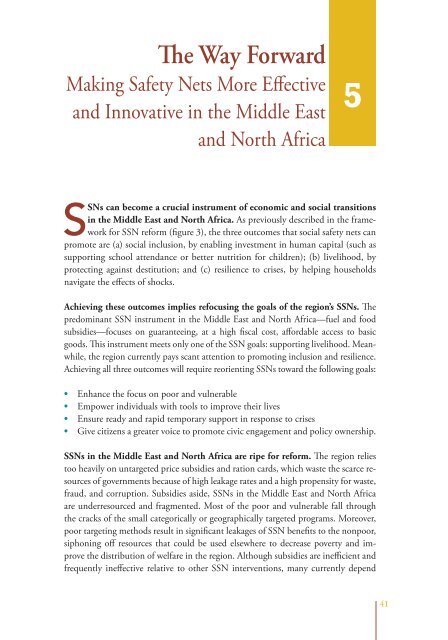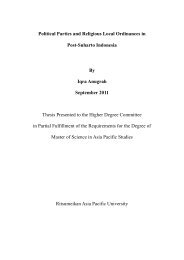You also want an ePaper? Increase the reach of your titles
YUMPU automatically turns print PDFs into web optimized ePapers that Google loves.
The Way Forward<br />
Making Safety Nets More Effective<br />
<strong>and</strong> Innovative in the Middle East<br />
<strong>and</strong> North Africa<br />
5<br />
SSNs can become a crucial instrument of economic <strong>and</strong> social transitions<br />
in the Middle East <strong>and</strong> North Africa. As previously described in the framework<br />
for SSN reform (figure 3), the three outcomes that social safety nets can<br />
promote are (a) social inclusion, by enabling investment in human capital (such as<br />
supporting school attendance or better nutrition for children); (b) livelihood, by<br />
protecting against destitution; <strong>and</strong> (c) resilience to crises, by helping households<br />
navigate the effects of shocks.<br />
Achieving these outcomes implies refocusing the goals of the region’s SSNs. The<br />
predominant SSN instrument in the Middle East <strong>and</strong> North Africa—fuel <strong>and</strong> food<br />
subsidies—focuses on guaranteeing, at a high fiscal cost, affordable access to basic<br />
goods. This instrument meets only one of the SSN goals: supporting livelihood. Meanwhile,<br />
the region currently pays scant attention to promoting inclusion <strong>and</strong> resilience.<br />
Achieving all three outcomes will require reorienting SSNs toward the following goals:<br />
Enhance the focus on poor <strong>and</strong> vulnerable<br />
Empower individuals with tools to improve their lives<br />
Ensure ready <strong>and</strong> rapid temporary support in response to crises<br />
Give citizens a greater voice to promote civic engagement <strong>and</strong> policy ownership.<br />
SSNs in the Middle East <strong>and</strong> North Africa are ripe for reform. The region relies<br />
too heavily on untargeted price subsidies <strong>and</strong> ration cards, which waste the scarce resources<br />
of governments because of high leakage rates <strong>and</strong> a high propensity for waste,<br />
fraud, <strong>and</strong> corruption. Subsidies aside, SSNs in the Middle East <strong>and</strong> North Africa<br />
are underresourced <strong>and</strong> fragmented. Most of the poor <strong>and</strong> vulnerable fall through<br />
the cracks of the small categorically or geographically targeted programs. Moreover,<br />
poor targeting methods result in significant leakages of SSN benefits to the nonpoor,<br />
siphoning off resources that could be used elsewhere to decrease poverty <strong>and</strong> improve<br />
the distribution of welfare in the region. Although subsidies are inefficient <strong>and</strong><br />
frequently ineffective relative to other SSN interventions, many currently depend<br />
41



